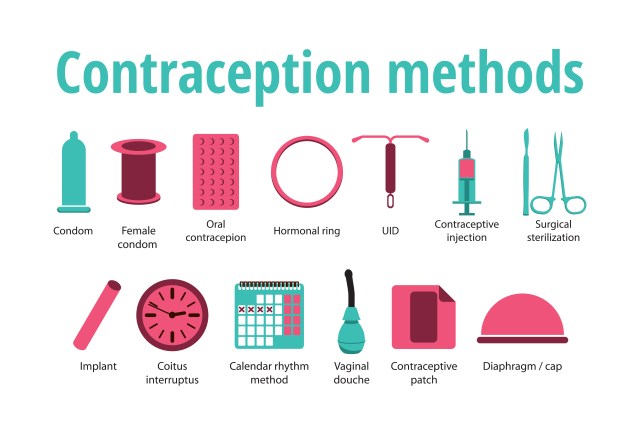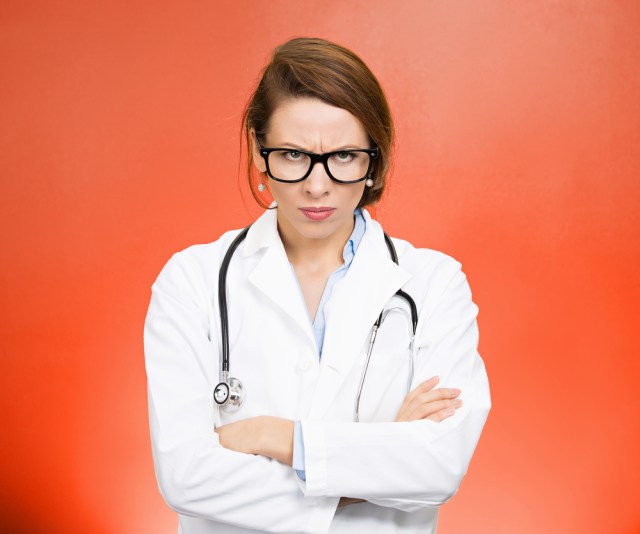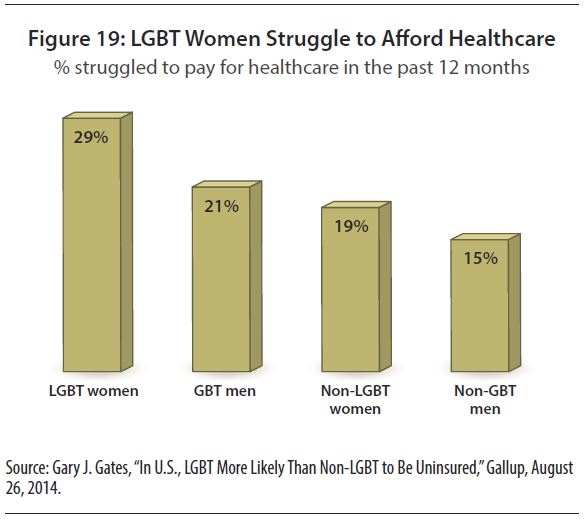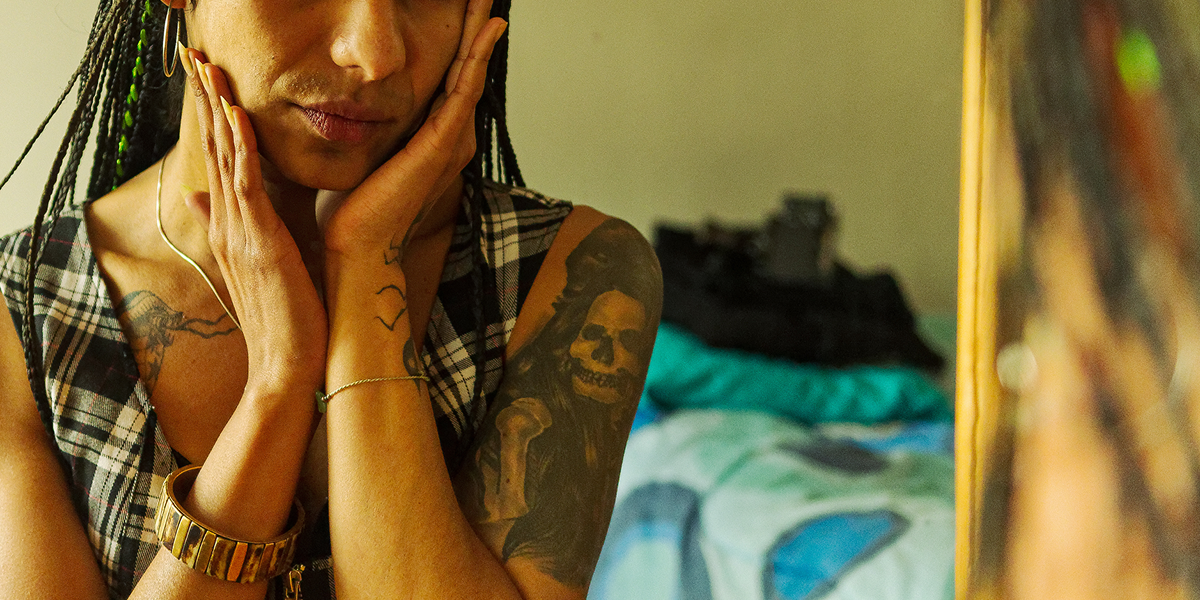Feature image via Shutterstock
The numbers are clear: bisexual women are at high risk for poor mental and physical health, are more likely to experience poverty, addiction and violence, and often experience discrimination within the health care system. But we don’t have to accept poor health or substandard care. Fortunately, the bi community is rallying around this issue to increase education and expand health care access.
Last March, the Bisexual Resource Center organized the first ever Bisexual Health Awareness Month. Today they’re wrapping up the second annual BHAM campaign, which focused on spreading awareness of bi health. They mobilized Facebook, Twitter and their own website (which has a ton of awesome links about all manner of bi health topics).
“It’s really important for our community to see health as an important issue for us,” said Ellyn Ruthstrom, a BRC board member and the organization’s former president.
Different women in the bi community face different levels of risk. Bi women who are trans, for example, face many more challenges in acquiring good insurance and are more likely to experience poverty. Bi women who are trying to get pregnant with a partner’s sperm have different needs than those using artificial insemination. There is essentially no specific research or information available about or for people who are bisexual and genderqueer or non-binary. Old age, poverty, race and geography can all affect risk and health care status. There is no one-size-fits all solution, but there are some general guidelines that bi women generally can benefit from when it comes to their health.
Compiled from the wisdom of numerous reports, online resources and experts, here are five ways that you can take care of your own health in the face of high risks, economic pressures and often incompetent care providers. Please share your own challenges, victories and ideas in the comments. Together, we can work to get our community healthy!
1. Know yourself, know your risks
Repeated studies have shown bisexual women are at high risk for numerous negative health outcomes. Bi women are more likely to smoke and experience addiction. We are more likely to experience depression and consider or attempt suicide compared to other groups. Bi women also have higher cancer risk than lesbian or straight women, and they are less likely to get proper screenings. Appendix A of Bisexual Health: An Introduction, a book by the LGBTQ Task Force, the Fenway Institute and BiNet USA offers an excellent and thorough primer on the particular health risks of bisexuals. Two studies from LGBT Movement Advancement Project — Understanding Issues Facing Bisexual Americans and Paying An Unfair Price: The Financial Penalty For LGBT Women In America — also have excellent statistics that explore different contexts for negative health outcomes for bi women. This report from the UK provides additional insight into the specific mental health challenges bi women experience — and it echoes similar reports from the U.S. and elsewhere.
Bi erasure and stigma against bisexuality is one of the most serious causes behind all these negative health outcomes, not just the mental health factors
“Research shows that bisexuals experience more discrimination, violence, and stigma than gays and lesbians,” said Amy André, a co-author of Bisexual Health: An Introduction. “I believe that the discrimination, violence, and stigma is directly linked to the fact that we have the worst health.”
The point of reminding y’all of all this isn’t to scare you. In fact, there is great power in knowing our risks. Just like I need to be aware of the genetic diseases that have affected my family, like colon cancer, diabetes and Alzheimers, it helps me protect myself if I know what my risks are as a member of the bisexual community.
“Individual bisexual people may feel they’re having individual experiences, but those are part of a larger shared experience,” said Dr. Magda Houlberg, the chief clinical officer at Howard Brown, an LGBTQ health center in Chicago.
Better understanding that shared experience reduces our individual risk and helps us advocate for ourselves and our community. The truth is, many medical providers may not be competent to address your needs as a bi woman, so if you are aware of your risk factors, you can be prepared to identify your needs to a doctor and also take preventative steps to keep yourself healthy. There’s a dearth of information about bi women’s health risks. However, leveraging the information that does exist will help you be prepared to take charge of your own health.
For example, many doctors will tell lesbian and bi women that they don’t need pap smears or shouldn’t learn about their options for birth control. However, numerous doctors and advocates insist this is false and are trying to correct the misconception. There’s also a huge lapse in research about safer sex for women who have sex with women and other people with vulvas, said Vanessa Schick, PhD, an assistant professor at the University of Texas Health Science Center at Houston School of Public Health. When lesbians and bisexual women ask for recommendations about how to have safer sex, doctors often don’t know what to tell them, she said, due to a lack of reliable information more than the failure of an individual doctor.
“There’s this perception that women aren’t at a risk for [sexual health problems] so we don’t need to fund research on it,” Schick said. “You need funding to demonstrate that there is in fact a risk. That’s a cycle that is really hard to break.”

Despite a lack of reliable data on many areas of bi health, one thing is clear: bi women should protect themselves against STIs, to get proper cancer screenings and to be treated with the same dignity as any woman patient seeking health care.
2. Find a competent health care provider and other trusted resources
In an ideal world, every doctor and nurse would be fully competent to address the unique challenges, risks and health outcomes of LGBT patients. Unfortunately, that’s not the case. In most urban settings, it shouldn’t be too hard to find an LGBT competent doctor — but even some of those may fail to be inclusive of the B in LGBT and instead lump bi patients in with lesbians or straight women or lecture bi women about promiscuity regardless of their sexual history. The Gay and Lesbian Medical Association has a directory of practitioners, and the Bisexuality-Aware Professionals Directory includes medical and mental health specialists. You can also get referrals from local LGBT resource and community centers. But not everyone has the privilege of a wide pool of doctors to choose from, either because their insurance is limited or because they are in a rural area and/or have limited ability to travel.

However, you have the right to a doctor who treats you with respect and who is compassionate toward your specific needs as a bisexual person. André put it this way:
Your provider works for you and is your employee. When you hire someone to work for you, you interview that person first. If that person doesn’t meet your standards, they don’t get the job. But if you are limited in being able to choose a provider, then you may be in a situation where you have to educate someone. In that case, try to find the person who seems like they will be the most compassionate and a good listener. Then, go from there. Direct your provider to read a book like Bisexual Health: An Introduction.
Most doctors and nurses don’t receive training in areas like LGBT cultural competency in medical school, but organizations like the BRC are working to get more doctors and health organizations the training they need to offer competent care to bi women and the community as a whole. And things are starting to improve. Ruthstrom of the BRC had a positive experience when she went to a new doctor.
The last time I went to a gynecologist, I was so happy because I didn’t have to do anything, because she asked me the proper questions. She was asking me the open ended and non-gender specific questions that a lot of providers should be asking. I commended her, because she asked me the right things to allow me to tell her what my identity was, what my current sexual behavior was. It’s not just about ‘this is how you address bisexual people’ it’s how you should address all people so all people can feel comfortable with responding in a supportive way.
There are also online resources, including many linked throughout this piece, that can help you care for yourself. These kinds of resources are not a substitute for diagnosis and treatment, but they can help you learn to develop a healthy lifestyle, identify your risks, ask the right questions and stand up for your health care rights.
3. Advocate for yourself
I’ll say it once more for the bleacher section: You have the right to good care! But, the system isn’t set up to ensure you get it. Bi women face challenges in accessing care from all angles, and acknowledging that is the first step toward tackling it.
“There are larger social constructs that keep women and specifically bi women from accessing care because they don’t know if it’s going to be safe and competent care,” said Shena Willbrandt, the manager of women’s health services at Howard Brown. “It is difficult to ask people to navigate a system that doesn’t really work for them.”
But there are ways to make the system work for us — it’s just a matter of being armed with information and insisting on the best care possible.
“Once you’ve found a provider you feel comfortable talking to, you’re going to get the best care possible if you’re open and honest, and that can feel scary,” Schick said. “For bi women there is stigma coming from all over. But it’s about as best you can trying to move past that fear and be your own advocate. No one can do that for you as well as you can do that yourself.”
If your doctor asks questions that pigeonhole you into a sexuality you don’t identify with, answer broadly to make sure you are giving clear information about your sexuality and past and current partners. Doctors should ask open ended questions, like “tell me about your sexual partners” and “tell me about your sexual identity,” said Houlberg, rather than specific questions about partners of only one sex. If they fail at this, you can still give more information to correct their assumptions.
Here’s a great guide to talking to your doctor about your needs as an LGBT patient from The Fenway Institute. But for some women, you may not be able to come out to your doctor — especially if you’re in a small community with only one general practitioner or OBGYN who also treats your family, your neighbors and your coworkers. There’s no catchall solution; instead it’s “about pushing yourself as far as you feel comfortable and advocating for your own health,” Schick said.
Whether you’re out to your health provider or not, you can still ask for information and screening for high risk areas such as depression and certain cancers — that goes back to the importance of knowing your risks.
4. Take advantage of opportunities to navigate financial barriers to health care
Health care is expensive. The bi community is at very high risk for poverty. That’s a dangerous combination. According to LGBT MAP’s Unfair Price study, bisexual women are more than twice as likely to live in poverty than the general population, and 29% of LGBT women struggle to afford health care, compared to 19% of heterosexual women. Organizations like Howard Brown provide low cost care to the LGBT community, but such programs don’t exist in every city, and rural queers have almost no access to such care.

Many medical providers and institutions don’t factor in economic security when considering a patient’s health and their access to care, and that’s dangerous, said Willbrandt.
“Economic security and the lack of that is something that isn’t recognized,” she said. “We talk a lot about our location and how if someone lives on the southside, will they be able to get to our services on the north side? How can we serve someone who needs childcare? So many factors affect both economic security and health.”
In Houston, Texas, Liz James and the Lesbian Health Initiative (which, she explains, serves the whole LGBTQ community, not just lesbians) are working to provide care to people in the state with the highest rate of un-insurance in the country. The Affordable Care Act provides a breakthrough for health care by insuring people who couldn’t get insurance previously and by directing billions of dollars to Federally Qualified Health Centers, which provide low- and no-cost care to poor people.
“We believe health care is a human right, and the Affordable Care Act is the biggest opportunity we’ve had to recognize that,” James said. “The president made it a priority for LGBT people to have access. Federal laws that say you can’t be discriminated against for your sexual orientation and gender identity.”
LHI works to reach low-income LGBT individuals through health care fairs where they can get comprehensive screenings, by connecting them with health centers for care if necessary, and by educating them on their rights. Expanding the data available on the risk factors that LGBT Texans (and Americans) face is one of the most important steps to increase access, she said. Increasing visibility in the data and increasing visibility in society will dramatically improve bisexual health outcomes, she said.
“We’ve got to help people get health literate,” James said. “Lesbians and bi women are more obese, so we need to understand how to eat right. We’re at higher risk for breast cancer so we need regular mammograms. We also need to understand how to get health insurance. We need processes and infrastructure to be training health professionals.” There are many factors that have limited bi women’s access to care, including cost and a lack of proper information.
Whether it’s a periodic free clinic in your community, an LGBT community center with strong health partners, a visit to Planned Parenthood, or a trip to a general practitioner covered by your insurance, it is critical to find affordable ways to access health care. The ACA is slowly but surely increasing access for LGBT people and many other marginalized communities. Find resources in your community that will help you learn about your eligibility and the process for getting signed up for insurance, or research the nearest free or low cost screening options.
5. Create community and get the word out
You aren’t alone in your quest for good health care. Find a community of people who you are invested in, and who are invested in you. Having a network of support — not just for health care, but for your whole self, will seriously improve your health.
“Research shows that women, even those who have the ACA, are not accessing services even when insurance covers it,” Willbrandt said. “Word of mouth, whether it’s about a specific provider and people saying go to this particular amazing provider, make sure you get your pap, that’s how people learn about the health care needs that they have and the resources available.”
And once you’ve gotten health care access, found out what kinds of care you need and how to get it, found a queer-competent, compassionate provider or identified a userful resource, spread the word to others. Set a good example by taking care of your health and encouraging your friends, partners, family members and community to do the same.
“We don’t have anybody else doing this for us, this is our responsibility,” James said. “We have to get our appointments. We have to be responsible. We can’t abdicate our responsibility to our own health. We need to encourage that and support it in our communities.”
No matter how bleak the statistics or how unaware the medical community when it comes to bisexual health, it is possible to get good health care. With education efforts like those of the BRC, experts like Schick dedicating research to our community’s needs, and community organizations around the country fighting to provide good care to bisexual women, the situation is on the up and up. It’s up to each of us to ensure we’re taking advantage of the resources available and fighting to spread access for all bi women.







